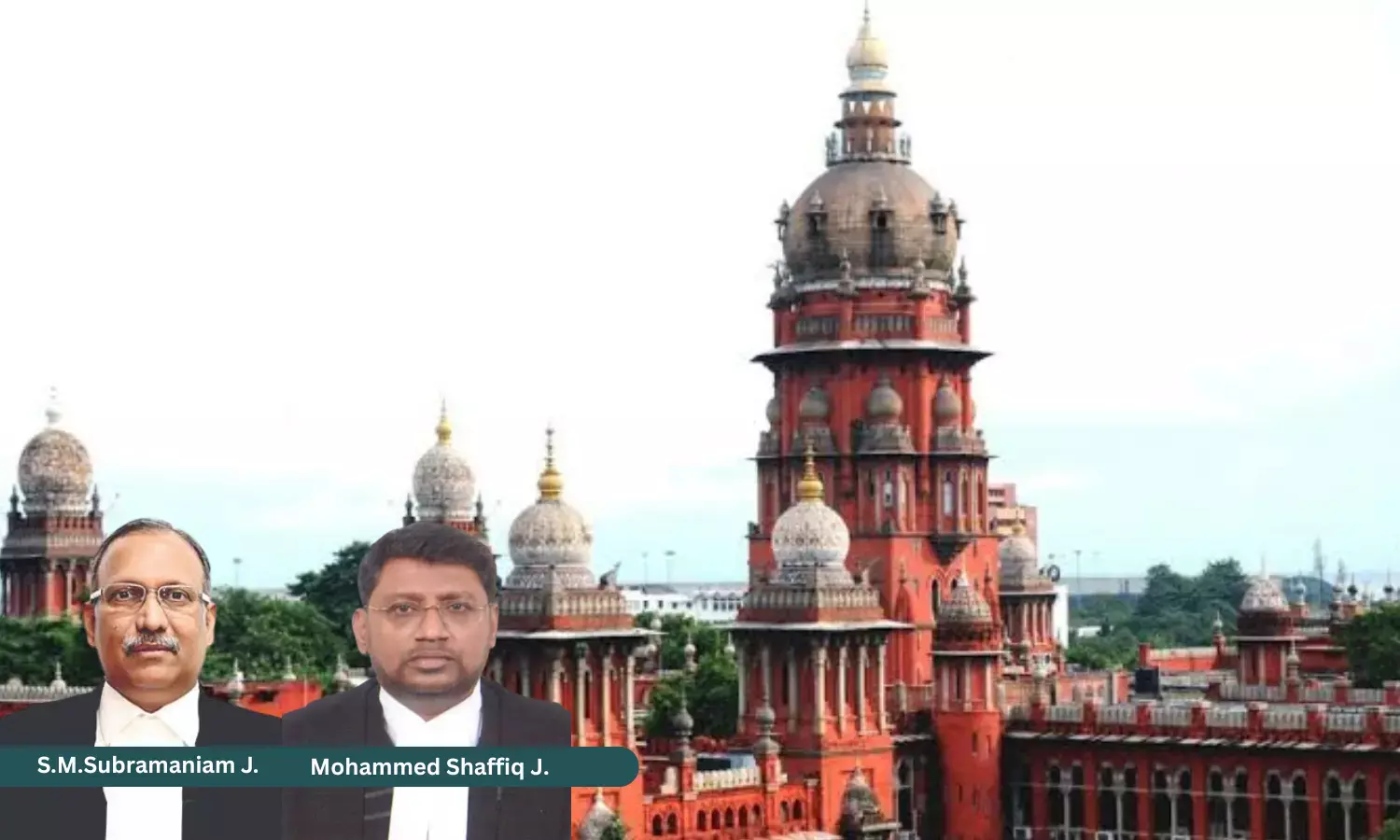Madras High Court: Any Document Or Instrument Presented For Registration Must Be Scrutinized At First Instance Regarding Correctness Of Stamp Duty Paid
The Madras High Court said that the presentant of the document may take a decision either to complete the registration or seek return of document.

Justice S.M. Subramaniam, Justice Mohammed Shaffiq, Madras High Court
The Madras High Court observed that any document or instrument presented for registration must be scrutinized at the first instance regarding correctness of the stamp duty paid.
The Court observed thus in a Writ Appeal preferred by a company, challenging the Writ Order passed by the Single Judge.
A Division Bench comprising Justice S.M. Subramaniam and Justice Mohammed Shaffiq said, “In view of Sections 33, 38 40, 42 and 48 of the Indian Stamp Act read with Rule 107 of the Registration Rules, the legal position is unambiguous that any document/instrument presented for registration must be scrutinized at the first instance regarding correctness of the stamp duty paid. Once the Registering Authority found insufficient stamp duty has been paid, he is duty bound to impound the document and send it in original to the Collector for determination of stamp duty. After determination and recovery of deficit stamp duty, the document is to be sent back to the Registration Authority, who in turn has to issue notice to the presentant of the document.”
The Bench added that the presentant of the document may take a decision either to complete the registration or seek return of document.
Advocate Derrick Sam G appeared for the Petitioner, while Special Government Pleader (SGP) U. Baranidharan appeared for the Respondents.
Brief Facts
The Appellant company had presented a document before the Sub Registrar/Registering Authority for registration in the year 2021. It was an assignment agreement and the Registering Authority referred the matter to the District Registrar, Administration, on the ground that the document presented for registration was not sufficiently stamped. The Appellant found that the stamp duty is very high and took a decision to take back the document presented for registration.
Since the Appellant took such a decision, an application was moved for return of document presented for registration. The said application was dismissed by the Registering Authority, against which a review was preferred, questioning the demand of stamp duty by the authority. The said review was rejected by reducing the stamp duty. The document was impounded to recover the stamp duty and under these circumstances, the Writ Petition was filed. Since the same was dismissed, the Appeal was filed before the High Court.
Reasoning
The High Court in the above context of the case, remarked, “A close reading of Rule 107 of the Registration Rules would indicate that an impounded document sent by the Registering Authority to the Collector for determination of deficit stamp duty. On receipt of an order from the Collector, the Registering Authority shall immediately give notice in writing to the presentant or to the person authorised by the presentant to take delivery of the document, either to take steps to complete the registration of the document or to take delivery of the document.”
The Court noted that impounding the document under the Indian Stamp Act and sending it in original to the District Collector for determination and recovery of deficit stamp duty becomes mandatory on the part of Registering Authority.
“Once the stamp duty is determined by the Collector and an order is communicated to the Registering Authority, such Registering Authority is duty bound to issue notice in writing to the presentant of the document. On receipt of the notice, the presentant of the document at his choice may proceed with the registration or file an application seeking return of the document. Therefore, it is unambiguous that the choice of the presentant of the Document will come into play only after determination of stamp duty by the Collector and recovery of stamp duty by following the procedures contemplated under the Indian Stamp Act”, it added.
The Court observed that the statute contemplates an instrument executed and presented for registration must be scrutinized and correctness of stamp duty paid in the document to be verified.
“Therefore, non registration of an instrument presented would not be a ground to seek return of document. Execution of document would be sufficient for the purpose of recovering deficit stamp duty by invoking the provisions of Indian Stamp Act”, it said.
Accordingly, the High Court dismissed the Writ Appeal and confirmed the impugned Order.
Cause Title- Gita Power and Infrastructure Private Limited v. The Inspector General of Registration & Ors. (Case Number: W.A.No.1609 of 2024)


